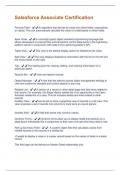Exam (elaborations)
Salesforce Associate Certification Questions And Answers Latest Updates
- Module
- Institution
Formula Field - ️️An algorithm that derives its value from other fields, expressions, or values. This can automatically calculate the value of a field based on other fields. Apex Code - ️️Is a strongly typed, object-oriented programming language that allows developers to execute flow and...
[Show more]



